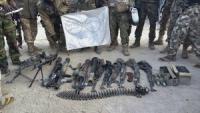-
Berlin attack: security intelligence has limits in preventing truck-borne terror
The Christmas market truck assault in Berlin, which has left twelve dead and dozens injured, is a disturbing echo of the truck-borne attack on Bastille Day celebrants on the Nice promenade in July. How could such events be allowed to happen? Why weren’t intelligence agencies in Germany and France able to stay one step ahead of the perpetrators? The role of the security and intelligence agencies to remain vigilant and seek to monitor extremist elements will undoubtedly endure. The secret of their success will continue to be keeping their successes secret. However, this does not absolve the rest of society from remaining engaged in community, by being inclusive, welcoming, and helpful, while also maintaining a level of vigilance many had come to associate with a bygone era.
-
-
Newspaper apologizes for saying terror links prevented U.K. Muslim family from going to Disneyland
The Mail Online, the Web site of the British newspaper Daily Mail, has issued an apology for running stories depicting a Muslim family as extremists, after family members were denied entry to the United States last year for a vacation in Disneyland. Two articles by Mail reporter Katie Hopkins suggested that Mohammed Tariq Mahmood and his brother, Mohammed Zahid Mahmood, were extremists with links to al Qaeda.The Mail Online has agreed to pay “substantial damages” totaling £150,000 to the Mahmood family. Hopkins also tweeted an apology on Monday.
-
-
Truck attack on Berlin shoppers kills 9, injures 50

At least nine people were killed and more than fifty injured when a truck plowed into a crowd at the popular Christmas Market in Berlin two hours ago (Monday afternoon EST). The attack happened in Breitscheidplatz, a major square in the center of the German capital. The Mirror notes that every year, the city of Berlin hosts a Christmas market at the square. The market consists of “more than 100 beautifully decorated market stands and Christmas booths as well as 70 fairground rides,” according to the city’s Web site.
-
-
Russia’s ambassador to Turkey assassinated in Ankara
Andrey Karlov, Russia’s ambassador to Turkey, was killed earlier today by a gunman waiting for him at a photo exhibition in Ankara. The attack by a well-dressed attacker was caught on camera. A spokeswoman for Russia’s Foreign Ministry said that Russia considered the shooting a terrorist attack. Just before he started shooting, the lean-shaven gunman shouted in Arabic, “Don’t forget Aleppo, don’t forget Syria. Don’t forget Aleppo, don’t forget Syria.” He then yelled: “Until these places are safe you will not taste any safety either.”
-
-
Saudi Arabia lobbies U.S. lawmakers to amend terrorism compensation law
Saudi Arabia has intensified its lobbying campaign in the United States in an effort to persuade American lawmakers to change a the Justice Against Sponsors of Terrorism Act (JASTA), a law which allows victims of the 9/11 terrorist attacks to sue countries implicated in terrorism against the United States – but a law which even its authors said was aimed at Saudi Arabia.
-
-
Is Iran cooperating with North Korea on a nuclear weapon?
Spurred by a letter written by Sen. Ted Cruz (R–Texas) to three senior Obama administration officials, investigative journalist Claudia Rosett on Thursday examined the possibility that Iran and North Korea are collaborating on nuclear weapons research in the wake of last year’s nuclear deal. Rosset explained that the two nations have a history of collaborating on weapons development. Usually, North Korea undertakes much of the development while Iran that foots the bill, with technicians traveling back and forth between the countries.
-
-
With proliferation of small arms, absence of war does not equal peace

The proliferation of small arms across many regions of Africa affected by conflict – or adjacent to chronic conflicts – have brought misery, but it has also provided a means for lawless groups to supplement the meagre rewards of nomadic pastoralism through raiding or other forms of violence. Governments in conflict or former conflict zones often have vested interests in maintaining informal armed groups beyond the army and other state security forces — for the entrenchment of political elites, the garnering of rents through armed extortion, or as potential weapons against hostile neighbors. The over-arching problem, according to one researcher, is that “Ending the war is not enough. The issue is to escape the inter-war situation maintained and reproduced by the state.”
-
-
Health wearable devices pose new consumer and privacy risks
Watches, fitness bands, and so-called “smart” clothing, linked to apps and mobile devices, are part of a growing “connected-health” system in the U.S., promising to provide people with more efficient ways to manage their own health. These personal health wearable devices, which are used to monitor heart rates, sleep patterns, calories, and even stress levels, raise new privacy and security risks, according to a new report.
-
-
Most U.K. terrorism arrests do not lead to convictions
Fewer than two in ten people detained by police since September 2001 were convicted directly of terrorism or a terrorism-related offence. The Home Office figures show that 3,349 people in England and Wales were arrested under terrorism laws since the devastating 9/11 attacks in the United States. Of those arrested for terrorism and related offenses, 17.8 percent were convicted for involvement in violent jihad – including plotting attacks or funding or facilitating terrorism.
-
-
The secrets of Saberin, Iran’s elite commando unit operating in Syria and Iraq
In 2001, Iran’s Islamic Revolutionary Guard Corps (IRGC) established a special unit consisting of handpicked members of the IRGC’s land, sea, and air forces. Dubbed the Saberin Unit, its members were described as volunteers “seeking martyrdom,” tasked to carry out special missions and/or widespread cross-border attacks for the IRGC.
-
-
Banning extremist groups is more political symbolism than effective counter-terrorism
For the first time in the UK, the government has moved to ban a right-wing, neo-Nazi group called National Action. Our own research has argued that the power to ban groups has questionable value for reducing the threat of terrorism. This skepticism dovetails with the work of other researchers who doubt that contemporary terrorist groups are appropriate targets for “listing” because they tend not to exist as coherent organizations with a fixed identity and an identifiable membership. The effectiveness of banning National Action, however, might be far less important than the communication of a message that groups such as this are unwelcome in contemporary British society.
-
-
DHS S&T transitions eighth cybersecurity technology to commercialization
DHS S&T has announced the eighth cybersecurity technology transitioning to commercialization as a part of its Cyber Security Division’s (CSD) Transition to Practice (TTP) program. ZeroPoint has spun off as a startup company called ZeroPoint Dynamics.
-
-
Gulf States supporting fundamentalist Islamic activity in Germany
Saudi Arabia, Kuwait, and Qatar have been supporting fundamentalist preachers and groups in Germany, German foreign and domestic intelligence agencies said Monday. Religious organizations from those three countries, some connected to these countries’ governments, have been sending preachers to Germany as well as financing the construction of mosques and schools. The German security services believe that there is a connection between the increase in Gulf States-funded fundamentalist activity in German, and the arrival in Germany of hundreds of thousands of Muslim refugees from Syria. The fear is that these refugees offer the Salafists easy targets for recruitment.
-
-
Syrian opposition: Israeli airstrike hit chemical weapons intended for Hezbollah

An Israeli air raid on a depot controlled by the Syrian regime two weeks ago hit a supply of chemical weapons being transferred to the Iran-backed terror group Hezbollah, a spokesperson for a Syrian opposition group said Sunday. Israeli Defense Minister Avigdor Liberman obliquely suggested last week that Israel was responsible for the strike and that the target had been Hezbollah-bound chemical weapons; other Israeli leaders have made it clear in public statements and conversations with foreign leaders that they will act to prevent Hezbollah from acquiring “game-changing” weapons or strengthening its positions on Israel’s borders.
-
-
Game platform to help in preparing for strategic surprise
National security challenges today are increasingly complex and multi-dimensional, demanding technological solutions that reflect the combined expertise of a broad diversity of professionals. But even when such experts are available and engaged, progress towards an integrated solution can be slowed by the lack of a versatile, domain-agnostic, collaborative platform, where innovation can happen not just despite but because of the disparate mix of participants’ perspectives and experiences. DARPA aims to link global experts from varied disciplines via gaming platform to speed the application of emerging science and technology.
-
More headlines
The long view
Kinetic Operations Bring Authoritarian Violence to Democratic Streets
Foreign interference in democracies has a multifaceted toolkit. In addition to information manipulation, the tactical tools authoritarian actors use to undermine democracy include cyber operations, economic coercion, malign finance, and civil society subversion.
Patriots’ Day: How Far-Right Groups Hijack History and Patriotic Symbols to Advance Their Cause, According to an Expert on Extremism
Extremist groups have attempted to change the meaning of freedom and liberty embedded in Patriots’ Day — a commemoration of the battles of Lexington and Concord – to serve their far-right rhetoric, recruitment, and radicalization. Understanding how patriotic symbols can be exploited offers important insights into how historical narratives may be manipulated, potentially leading to harmful consequences in American society.
Trump Aims to Shut Down State Climate Policies
President Donald Trump has launched an all-out legal attack on states’ authority to set climate change policy. Climate-focused state leaders say his administration has no legal basis to unravel their efforts.
Vaccine Integrity Project Says New FDA Rules on COVID-19 Vaccines Show Lack of Consensus, Clarity
Sidestepping both the FDA’s own Vaccines and Related Biological Products Advisory Committee and the CDC’s Advisory Committee on Immunization Practices (ACIP), two Trump-appointed FDA leaders penned an opinion piece in the New England Journal of Medicine to announce new, more restrictive, COVID-19 vaccine recommendations. Critics say that not seeking broad input into the new policy, which would help FDA to understand its implications, feasibility, and the potential for unintended consequences, amounts to policy by proclamation.
Twenty-One Things That Are True in Los Angeles
To understand the dangers inherent in deploying the California National Guard – over the strenuous objections of the California governor – and active-duty Marines to deal with anti-ICE protesters, we should remind ourselves of a few elementary truths, writes Benjamin Wittes. Among these truths: “Not all lawful exercises of authority are wise, prudent, or smart”; “Not all crimes require a federal response”; “Avoiding tragic and unnecessary confrontations is generally desirable”; and “It is thus unwise, imprudent, and stupid to take actions for performative reasons that one might reasonably anticipate would increase the risks of such confrontations.”
Luigi Mangione and the Making of a ‘Terrorist’
Discretion is crucial to the American tradition of criminal law, Jacob Ware and Ania Zolyniak write, noting that “lawmakers enact broader statutes to empower prosecutors to pursue justice while entrusting that they will stay within the confines of their authority and screen out the inevitable “absurd” cases that may arise.” Discretion is also vital to maintaining the legitimacy of the legal system. In the prosecution’s case against Luigi Mangione, they charge, “That discretion was abused.”
